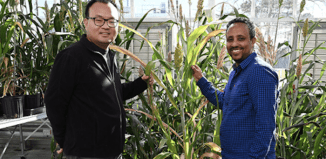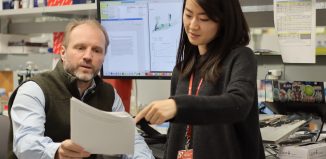CSHL’s Iossifov studies genetics of autism
Ivan Iossifov is using computer programs to try to understand the genetic piece of the autism puzzle. An assistant professor at Cold Spring Harbor Laboratory, Iossifov is comparing the genome of people with autism with the sequences from their unaffected siblings.
Iossifov explores areas of the genome where mutations might increase the risk of autism. He is searching for a “list of genes that, when you take it, can lead to autism directly or can increase the risk of a child being autistic,” he said. “Some genes are frequently mutated in autism.”
He can approach this mission by looking at “every nucleotide in each parent and each sibling,” he said. “We can zoom in on very particular genes.”
Historically, he said, genetic technology first allowed scientists to look for large-scale copy-number events, where a sequence of DNA might be repeated more frequently for one group of people than for another. As genetic sequencing has matured, however, he has been able to focus on nucleotide-level genetic variants, such as single base-pair substitutions.
“The new-generation sequencing technology becomes cheaper and faster amazingly quickly,” he said. “That does allow us to perform research that was unfeasible even five years ago.”
Iossifov said the research he’s conducting may help doctors and scientists understand some of the genetic components of autism. So far, his research shows that early genetic-based diagnosis is difficult. He estimates that he needs about ten times more genetic data in families before genetic-based diagnoses can become useful. While he said he is not an expert in autism, he said he strongly believes “that the earlier a child can be reliably diagnosed, the better.”
More broadly, Iossifov is interested in a large scope of neurodevelopment disorders as well as cancer. In the last few years, however, he’s focused considerable effort and attention on autism.
Autism, he explained, seems to require the kind of approach he has to research, looking at the big picture and narrowing that down to individual genes or even base pairs. So far, he has looked at the 1 percent of the nucleotides in the human genome that encode genes.
“We have been carefully examining each variant for its potential effect on the gene it belongs to,” he said. “We analyze thousands of families, focusing in on de novo variants,” variants present in a child and not in her parents.
Iossifov is now planning to extend his analysis over the complete genome. He is hoping to hire new staff before long, to help with data collection and analysis.
Iossifov is grateful for the backing of the Simons Foundation, which provided funding and supported the collection of many of the genetic samples he is studying. He hopes the foundation will continue to endorse efforts to scrutinize additional areas of the genome, even those that other scientists hadn’t previously considered, to find other regions where he might discover “interesting variants.”
Iossifov splits his time between Philadelphia, where his wife Ani Nenkova works in the Department of Computer and Information Science at the University of Pennsylvania, and Long Island. The couple have a four-year old son Pascal, whom they call “Paco.”
When he’s on Long Island, he enjoys visiting beaches. Iossifov said he speaks “one and a half” languages, although, at this point, he’s not sure which is the half. He grew up speaking Bulgarian, but his friends at home suggest he’s developed an American accent in his native tongue. “I apparently sound funny” speaking Bulgarian, he said.
Iossifov said his parents didn’t push him to do anything in particular, although he is following somewhat in the footsteps of his father, who is a retired chemist.
In terms of teaching their son about the world, Iossifov and Nenkova encourage him to understand that “he can go deeper,” in whatever he learns.
Iossifov is excited to continue working with autism. “Autism is a complex disorder and is highly prevalent. Any progress on autism would be great on many aspects.”






